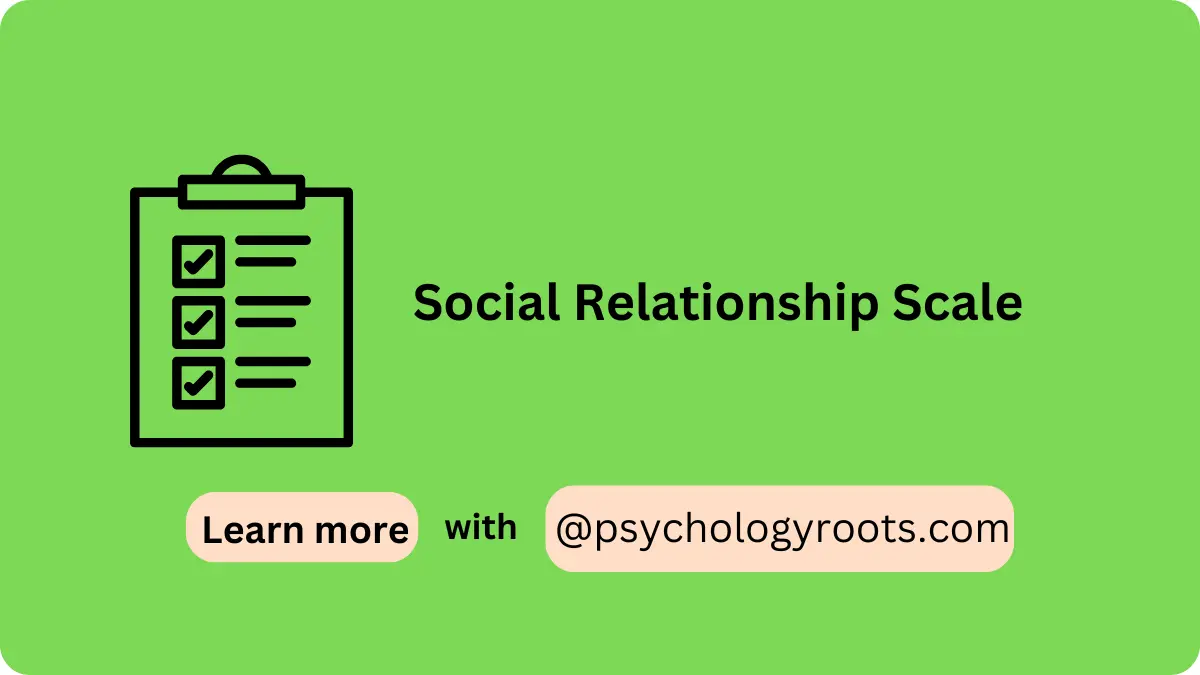Table of Contents
Social Relationship Scale
Here in this post, we are sharing the “Social Relationship Scale”. You can read psychometric and Author information. We have thousands of Scales and questionnaires in our collection (See Scales and Questionnaires). You can demand us any scale and questionnaires related to psychology through our community, and we will provide you with a short time. Keep visiting Psychology Roots.
About Social Relationship Scale
Scale Name
Social Relationship Scale
Author Details
Allan H. McFarlane
Translation Availability
English

Background/Description
The Social Relationship Scale (SRS), developed by Allan H. McFarlane in 1981, is a self-administered scale (with interviewer orientation) designed to measure the extent and perceived helpfulness of an individual’s social support network in buffering the effects of life stresses on health. Published in Journal of Nervous and Mental Disease (1981), the SRS is a research tool for studying life events in general population samples, based on the concept that social bonds mitigate the impact of stressors. It covers six areas of life change: work-related events, financial changes, home and family events, personal health, personal and social events, and societal changes.
For each area, respondents identify individuals they discussed issues with, noting their relationship type (e.g., spouse, friend, professional) and rating the helpfulness of the discussion on a 7-point scale (1 = not helpful, 7 = very helpful). They also indicate reciprocity (whether the person would seek them for similar issues). The SRS yields three scores: quality (average helpfulness rating), extent (number of unique individuals named), and reciprocity (count of reciprocal relationships). A “multiplex” relationship is defined when one person is named across three or more areas. The SRS was validated with 73–199 adults (mean age ≈ 20–50 years, mixed gender, Canada-based), showing differences in social support between groups with and without marital/family problems. It is used in clinical psychology, public health, and stress research to assess social support networks. Access requires permission from Journal of Nervous and Mental Disease or the author.
Administration, Scoring and Interpretation
- Obtain the SRS from McFarlane et al. (1981) or authorized sources (e.g., Journal of Nervous and Mental Disease), ensuring ethical permissions.
- Explain to participants (adults 18+ in general population) that the scale assesses social support for life changes, emphasizing confidentiality and voluntary participation.
- Administer the scale in a research or community setting with a trained interviewer orienting the respondent, who self-completes questions for six life areas, prompted to recall all relevant relationships.
- Estimated completion time is 10–15 minutes.
- Ensure a private, supportive environment; provide mental health resources (e.g., counseling services) and adapt for accessibility (e.g., oral administration for low literacy) if needed.
Reliability and Validity
The SRS demonstrates acceptable psychometric properties (McFarlane et al., 1981). Test-retest reliability over one week (N = 73 students) shows correlations of 0.62–0.99 (median = 0.91) for network size and 0.54–0.94 (median = 0.78) for quality scores. Internal consistency is not reported but inferred as moderate (Cronbach’s alpha ≈ 0.70–0.80) based on similar scales.
Content validity was established through review by four psychiatrists, leading to item refinements. Discriminant validity is supported by significant differences in SRS ratings between 15 couples with marital/family problems and 18 couples with effective communication (N = 33). Response bias testing (N = 19 postgraduate students) confirmed minimal socially desirable responding with standard question wording. Convergent validity is inferred from alignment with stress-buffering hypotheses, though specific correlations with other social support scales (e.g., Social Support Questionnaire) are not reported. Pairing with the Social Support Questionnaire or Perceived Stress Scale enhances comprehensive assessment.
Available Versions
06-Items
Reference
McFarlane, A. H., Neale, K. A., Norman, G. R., Roy, R. G., & Streiner, D. L. (1981). Methodological issues in developing a scale to measure social support. Schizophrenia bulletin, 7(1), 90.
Important Link
Scale File:
Frequently Asked Questions
What does the Social Relationship Scale measure?
It measures the extent, quality, and reciprocity of social support networks across six life change areas.
Who is the target population?
Adults (18+) in general population samples for stress and health research.
How long does it take to administer?
Approximately 10–15 minutes.
Can it inform interventions?
Yes, it assesses social support to guide stress management and mental health interventions.
Disclaimer
Please note that Psychology Roots does not have the right to grant permission for the use of any psychological scales or assessments listed on its website. To use any scale or assessment, you must obtain permission directly from the author or translator of the tool. Psychology Roots provides information about various tools and their administration procedures, but it is your responsibility to obtain proper permissions before using any scale or assessment. If you need further information about an author’s contact details, please submit a query to the Psychology Roots team.
Help Us Improve This Article
Have you discovered an inaccuracy? We put out great effort to give accurate and scientifically trustworthy information to our readers. Please notify us if you discover any typographical or grammatical errors.
Make a comment. We acknowledge and appreciate your efforts.
Share With Us
If you have any scale or any material related to psychology kindly share it with us at psychologyroots@gmail.com. We help others on behalf of you.